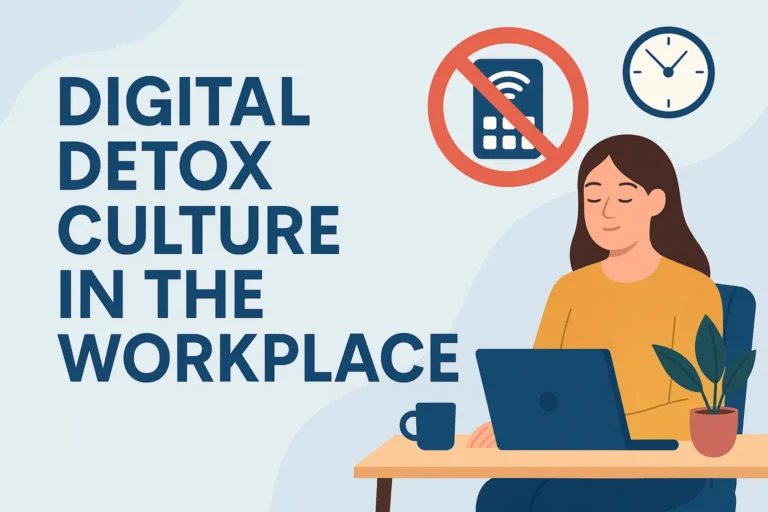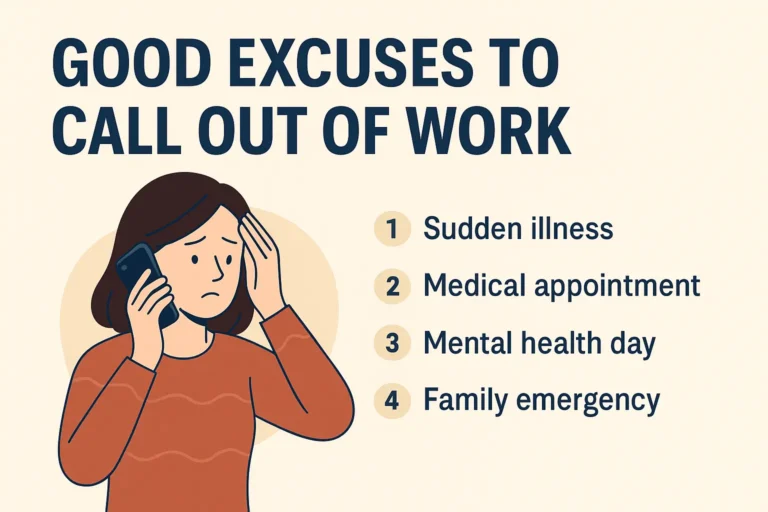Building Your Personal Brand at Work: Stand Out Without Shouting
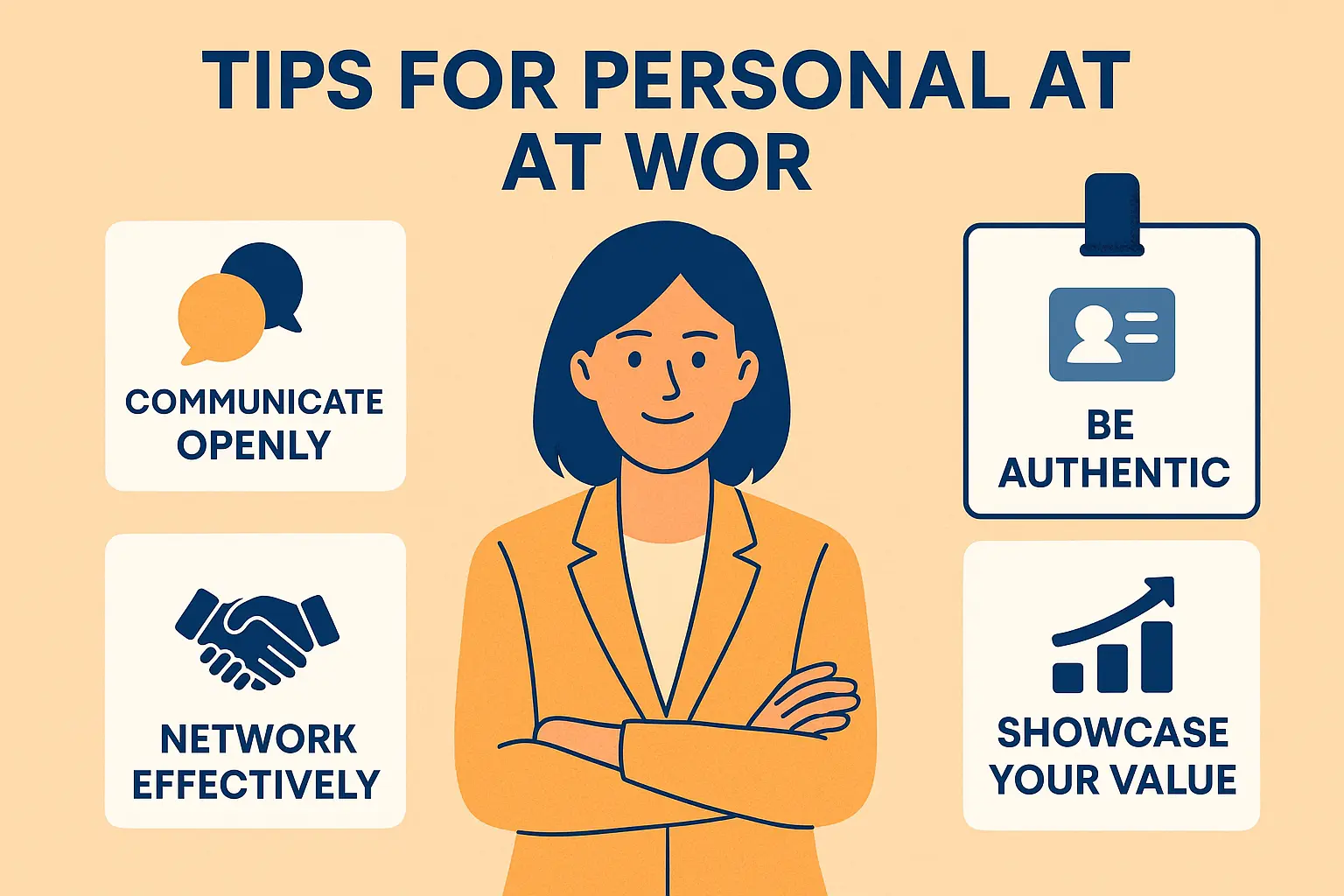
Being good at your job isn’t always enough. In today’s workplaces, how people perceive you carries real weight. That’s where building your personal brand at work changes everything. Your personal brand is the reputation you earn—what people think of when they hear your name in a meeting or consider you for a project. It shows in how you communicate, the results you deliver, and the way you carry yourself every day.
Branding yourself at work doesn’t mean becoming someone you’re not. It’s about highlighting what’s already strong within you—your ideas, values, and reliability—and making sure others notice in a natural, authentic way. When done right, a personal brand becomes your silent ambassador, opening doors to new roles, recognition, and relationships that move your career forward.
|
Action |
Why It Builds Your Brand |
|---|---|
|
Speak up with clarity in meetings |
Shows leadership and purpose |
|
Support your coworkers’ successes |
Builds trust and team reputation |
|
Share your ideas on internal platforms |
Increases visibility and thought leadership |
|
Keep your communication style consistent |
Reinforces your personal values and message |
|
Volunteer for cross-team projects |
Expands influence across departments |
What Does Personal Branding at Work Really Mean?
Personal branding at work is about how people experience you—your communication style, your values, how you carry yourself, and the reputation you leave behind after every meeting or project. It’s not a logo or a slogan. It’s not about self-promotion or being the loudest person in the room.
A personal brand is the set of impressions people consistently associate with you. Think about how colleagues describe you when you’re not around. Are you seen as reliable? Strategic? A problem-solver? That’s your personal brand in action.
This isn’t something you manufacture overnight. It grows through repeated behaviors, small daily choices, and the tone you set in interactions, no matter your role or level.
Why It Matters in Your Career Journey
Career growth doesn’t just come from doing the job—it comes from being remembered for how you do it. That’s where a strong personal brand sets you apart.
In modern workplaces, visibility often drives opportunity. You might deliver excellent work, but unless others recognize your impact, you risk being overlooked. Your brand helps people associate your name with value, reliability, and leadership potential—even when you’re not in the room.
A clear personal brand also acts as a filter. It draws the right projects, mentors, and networks toward you, while helping you navigate decisions that align with who you are professionally. It’s a career compass, not a popularity contest.
Why Building Your Brand at Work Gives You an Edge
Workplace success isn’t always about being the most talented. It’s often about being trusted, remembered, and respected. A strong personal brand gives you that edge—without needing to constantly prove yourself.
It turns your daily actions into signals of trust. When people know what to expect from you, they bring you into conversations earlier, loop you into important decisions, and consider you for leadership before you even ask.
You’re no longer just a name on a list. You become someone people turn to when they need clarity, direction, or calm under pressure. That’s where your brand quietly does the heavy lifting.
Visibility, Influence, and Leadership Presence
A well-built personal brand isn’t just about recognition. It builds something deeper—influence. People start listening when you speak, not out of obligation, but because your insights carry weight.
Your visibility increases not because you chase the spotlight, but because others start spotlighting your work. You get tapped for cross-functional projects. Senior leaders begin to take notice. Your name gets recommended in rooms you’ve never stepped into.
Leadership presence doesn’t mean you need a title—it means people instinctively look to you for direction. That kind of presence is rooted in a consistent, clear personal brand.
How to Brand Yourself Authentically
Authenticity isn’t a style—it’s a standard. The most trusted personal brands at work come from knowing yourself well and showing up consistently, not from copying what works for others.
Branding yourself authentically starts with clarity. What do you believe in? What kind of work energizes you? What values do you refuse to compromise? When your brand reflects those answers, it becomes magnetic. People start to associate you with integrity, focus, and follow-through.
You don’t need to play a role or constantly self-promote. You just need to stay true to what makes you effective and valuable—then reflect that in how you lead conversations, handle feedback, and contribute to the team.
Knowing Your Strengths and Values
A strong personal brand is grounded in self-awareness. That means identifying the work you naturally excel at—and the core values that guide your choices.
Are you a fixer, a builder, a listener, a driver? Do you value collaboration, precision, creativity, or speed? When you know what you’re best at and what matters most to you, your professional presence starts to feel more intentional.
These aren’t soft reflections. They’re practical tools that help you decide how to show up each day, how to manage conflict, how to set boundaries, and how to lead without needing permission.
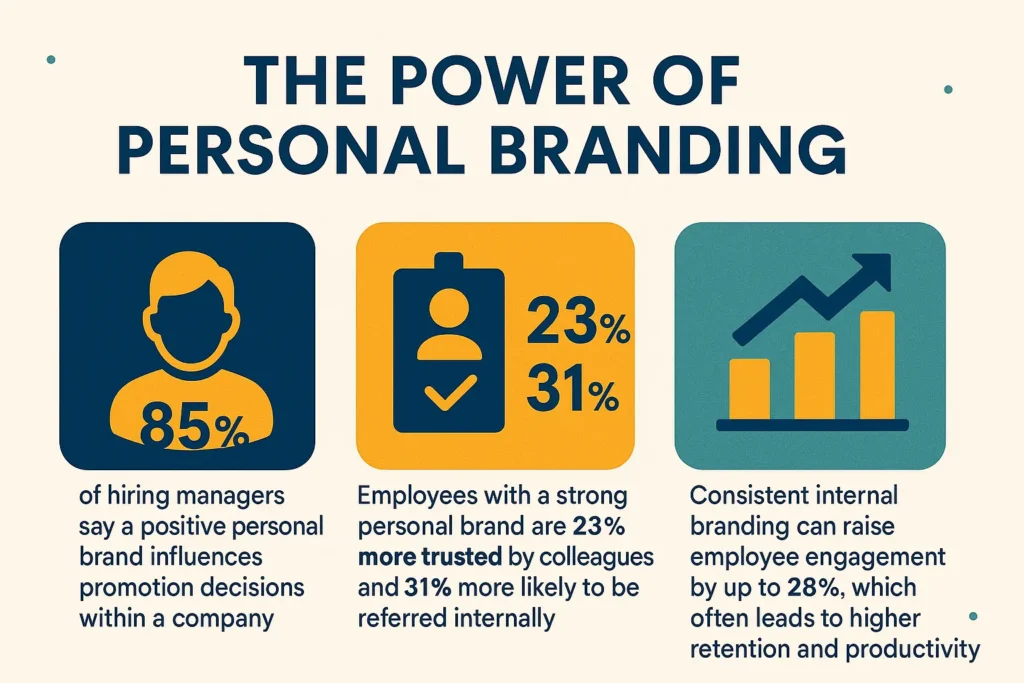
Aligning Your Actions with Your Message
Your message means nothing if your actions don’t back it up. People notice patterns, not promises. So once you’ve defined your personal brand, every interaction becomes a small but meaningful way to reinforce it.
For example, if your brand is built around being a clear communicator, then your emails, updates, and meeting comments need to reflect that clarity. If your brand centers on creative problem-solving, people should see that in how you tackle roadblocks, not just hear you mention it.
Over time, those consistent actions become your brand’s proof—not its pitch.
Simple Ways to Build Your Personal Brand at Work Daily
Personal branding isn’t a one-time task. It’s built in the daily choices you make, not just in big presentations or annual reviews. You don’t need a platform to make an impact—just a consistent presence.
Here’s how you start shaping your brand every day at work:
Speak Up in Meetings with Purpose
Speaking up doesn’t mean talking more—it means saying things that move the conversation forward. When you contribute thoughtfully in meetings, people begin to associate your brand with clarity, insight, and confidence.
Ask strong questions. Offer practical suggestions. Summarize what others are missing. One good comment can shift how the room sees you and what you bring to the table.
Be Consistent in Communication
A strong brand doesn’t surprise people—it reassures them. If your tone, follow-ups, and messaging are consistent, you build trust fast. This isn’t just about style—it’s about reliability.
Whether you’re sending a quick Slack message or leading a team sync, your communication should reflect the same clarity and intention. That kind of consistency tells people they can count on you, and that’s a powerful part of your brand.
Deliver Results Others Can Rely On
Nothing speaks louder than delivering. Results become your reputation.
When people know you’ll meet deadlines, solve issues without drama, and follow through, your brand starts to carry weight. You don’t have to tell others you’re dependable—they’ll say it for you.
This doesn’t mean doing more. It means doing your work with focus, showing your thinking, and giving others confidence in your process. That’s how your brand becomes not just noticed, but respected.
Personal Branding and Company Culture
Your personal brand doesn’t live in a vacuum. It grows—or withers—within the environment around you. And that environment is your workplace culture.
Building your personal brand at work means being aware of how your values and style fit into your company’s rhythm. Some workplaces thrive on collaboration and open dialogue; others value precision, speed, or discretion. The key isn’t changing who you are—it’s showing how you bring value within that culture.
When you align your brand with what your workplace cares about, you’re not blending in—you’re adding depth. You become someone who understands how to move things forward while staying true to yourself.
Fitting Your Brand Within Your Workplace Environment
You don’t have to fit a mold to make your mark. But your brand will gain traction faster if it connects with your environment.
Think of it like this: What does your company respect? What traits or behaviors get recognized and rewarded? If your strengths naturally align, lean into them more visibly. If they don’t, find smart ways to bridge the gap.
For example, in a data-driven culture, your brand of creativity might be more powerful when paired with evidence. In a traditional setting, bold ideas can land better when shared through formal channels. This isn’t compromising—it’s translating your strengths in a way your workplace understands.
Building Influence Without Clashing with Leadership
Having a strong personal brand doesn’t mean being loud or rebellious. Influence grows when you show respect for leadership while still bringing your own perspective to the table.
This balance starts with listening. Know your leaders’ priorities. Understand their communication styles. Then position your ideas to support shared goals, not compete with them.
You’re not building influence by challenging leadership—you’re building it by making things better. When leaders see you as someone who gets things done, solves problems, and brings others along, your brand becomes an asset they’ll want to support.
Did You Know?
Only 33% of employees actively manage their personal brand at work, yet they’re 3X more likely to be offered leadership roles.
How to Build Your Personal Brand Without Self-Promotion
You don’t need to sell yourself to build a brand. In fact, the strongest brands often come from people who stay focused on impact—not applause.
When you consistently deliver, collaborate thoughtfully, and hold yourself to a high standard, people notice. They remember how you made their job easier or how you brought clarity to a tough moment. That’s personal branding in motion—without ever needing to boast.
Let others discover your strengths through the way you work, not just through what you say.
Letting Your Work Speak for Itself
Results leave a longer impression than resumes. When you consistently meet expectations—or quietly exceed them—your reputation builds itself.
That project you finished ahead of schedule, the client you managed with tact, the new teammate you helped onboard—these moments define your brand far more than buzzwords or job titles.
People remember how you show up. They trust what you prove, not what you pitch. Keep your focus on delivering work that reflects your values, and your brand will follow.
Building Relationships That Reflect Your Values
Relationships shape your reputation just as much as your work. How you treat others, how you respond under pressure, and how you support your team—these behaviors form the human side of your brand.
Look for ways to build trust across departments. Ask smart questions. Offer help before it’s requested. Give credit generously. These small actions reflect who you are and what you stand for—and they often say more than a portfolio ever could.
When your relationships echo your values, your personal brand doesn’t just feel strong. It feels real.
Mistakes to Avoid When Branding Yourself at Work
Building your personal brand at work isn’t just about what you do right—it’s also about knowing what to avoid. A few common missteps can quietly damage how others perceive you.
Being Fake or Inconsistent
The fastest way to lose trust? Acting like someone you’re not. Personal branding only works when it reflects who you truly are. Trying to adopt a voice or persona that doesn’t match your values creates confusion. People sense it.
If your actions say one thing but your message says another, your brand weakens. The most respected professionals are the ones who stay true to their strengths—even when it’s not the loudest path.
Stick with what you stand for, and let consistency build your credibility over time.
Over-Marketing Yourself
There’s a fine line between being visible and constantly self-promoting. When every conversation turns into a pitch or every success becomes a brag, it wears thin.
Your personal brand grows stronger when others talk about your work—not when you’re the only one doing it. Focus on being helpful, dependable, and solutions-oriented. People will notice without the noise.
Subtlety is powerful. You don’t have to oversell when the results speak for themselves.
Case Examples of a Strong Personal Brand at Work
Let’s get real. Not every strong personal brand looks like a keynote speaker or a LinkedIn influencer. Some of the most powerful brands belong to people who quietly shift the atmosphere around them.
Quiet Leaders Who Made an Impact
Think about that teammate who always knows how to defuse a tense moment. The one who listens first, offers thoughtful input, and consistently delivers on promises. They might not seek the spotlight, but their presence is felt—and respected.
These are the people whose personal branding happens naturally, through behavior and reliability. They don’t need to dominate meetings. Their brand is built on steady trust.
How Real People Built Trust and Presence
There’s also the colleague who became the go-to for cross-team collaboration. Not because they had the loudest voice, but because they had a reputation for bringing people together. Or the one who started mentoring quietly, just helping others grow without asking for credit.
Their personal brand is tied to values. That’s what sticks. Authentic presence, meaningful action, and relational influence—all without shouting about it.
How Your Personal Brand Fuels Career Growth
Personal branding isn’t just about being liked. It plays a direct role in how your career progresses inside the company and beyond.
Promotion Opportunities
When your brand aligns with results, reliability, and values, decision-makers take notice. You become someone they can trust to lead a new project or manage a bigger team. Promotions often go to those who are seen as both capable and credible—not just capable alone.
Your brand fills in the blanks when you’re not in the room. It tells your story in ways a résumé can’t. And it quietly builds the case for your next step forward.
Invitations to Lead, Mentor, or Represent
People with a clear personal brand often get tapped for roles beyond their job description. You might be asked to mentor new hires, lead a team workshop, or represent your department in company initiatives.
That’s no accident. It’s a sign that your brand has gained traction—that people see you as someone who carries the company’s values forward.
And that’s where your brand does its best work—not in a headline, but in the way others trust you to lead.
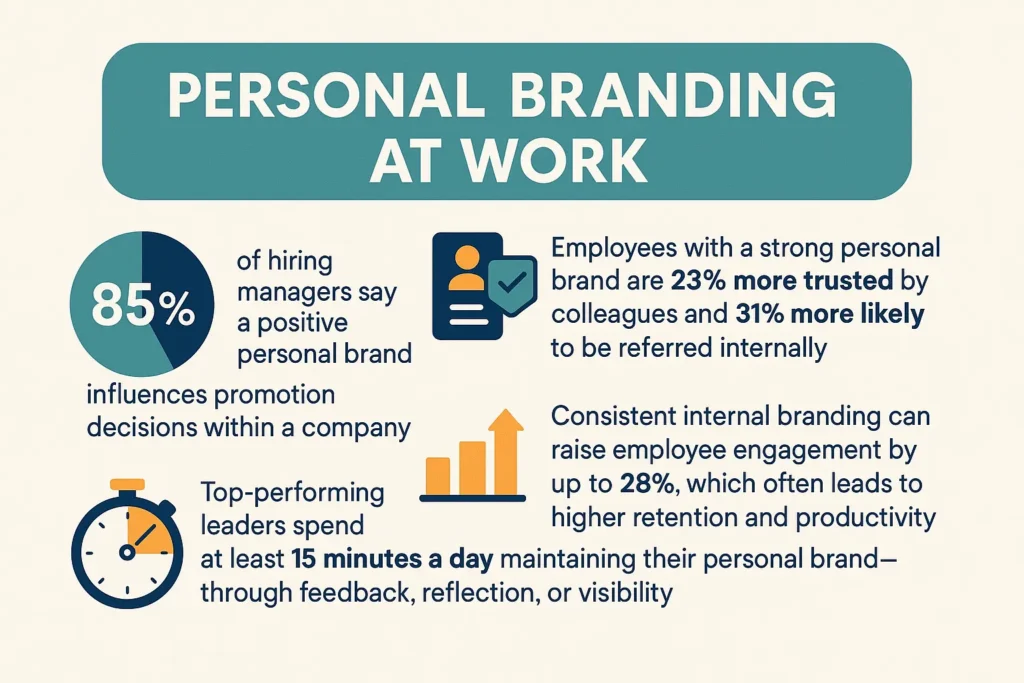
Conclusion: Your Personal Brand Is Already Speaking—Make Sure It’s Saying the Right Thing
You don’t need a loud personality to build your personal brand at work. You need clarity, consistency, and authenticity. The way you show up, contribute, and communicate all shape how others experience you.
Your personal brand isn’t just about standing out—it’s about being remembered for the right reasons. When done right, it becomes a quiet force behind new opportunities, stronger relationships, and long-term career growth. Start small, stay true to yourself, and let your everyday actions do the talking
FAQs: Building Your Personal Brand at Work

About the Author
Jonathan Savage is a leadership strategist who helps teams boost performance through clarity and structure. At SmartSuccessGuide.com, he shares proven frameworks for building focused, high-performing teams that deliver real results.


